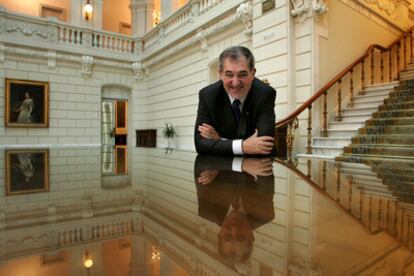US Embassy conspired to derail cases in Spain's High Court
Wikileaks reveals that prosecutors kept diplomats abreast of their legal strategies, with Washington lawmakers also intervening
The US Embassy in Madrid applied immense pressure on the current Socialist (PSOE) government to derail investigations at the Spanish High Court that targeted US government officials for alleged war crimes in Iraq, torture at the Guantánamo prison camp, and clandestine CIA flights with Al Qaeda suspects on board, according to secret cablegrams released by Wikileaks that were obtained by EL PAÍS.
Most of the cables complaining about the ongoing judicial investigations in Spain were made by then-US Ambassador Eduardo Aguirre, who served from 2005 to 2008, during President George W. Bush's last term in office. The cables illustrate how Aguirre personally pressured Spanish government officials, including prosecutors, to put a stop to the High Court's inquiries. In one cable dated March 21, 2007, Aguirre said he told Carles Casajuana, then-national security advisor at the prime minister's La Moncloa residence and now the Spanish ambassador in London, that he "was running out of patience with unfair government and PSOE statements regarding the US."
The previous day - the fourth anniversary of the Iraqi invasion - all parliamentary groups, with the exception of the main opposition Popular Party, agreed on a motion condemning the war. In an EL PAÍS column published on that day, High Court Judge Baltasar Garzón called for a judicial investigation into the war in Iraq, suggesting that Bush and former Prime Minister José María Aznar could be put on trial. José Blanco, the then-Socialist Party secretary, echoed these sentiments in a television interview, saying that "someone has to pay the consequences for that decision and horror." One of Aguirre's top advisors sent a "confidential" missive to Blanco conveying the US government's disapproval of his comments.
During that time, the US Embassy was worried about two investigations before the High Court that could have put the United States in a delicate position. One was the court inquiry into the killing of Telecinco cameraman José Couso in Baghdad by US soldiers in 2003; the other concerned the alleged CIA rendition flights that used Spanish airports for stopovers, taking Al Qaeda suspects to and from Guantánamo. The GTMO case was filed with the High Court on June 12, 2006.
The secret cables show that in both cases the US Embassy had inside information on the way the investigations were developing, and how diplomats were collaborating with Attorney General Cándido Conde-Pumpido and two High Court prosecutors, Javier Zaragoza and Vicente González Mota. To obtain their information, the US ambassador and his advisors put pressure on several ministers. Appointments were made for meetings at the High Court and embassy officials recruited visiting US lawmakers to also press the Spanish government for its assistance in getting the cases dropped.
Similar action was taken when the High Court opened its third investigation against the United States focusing on alleged instances of torture at Guantánamo prison. The inquiry set off alarms in Washington where officials feared that the High Court would apply its "universal jurisdiction" doctrine when it came to charging defendants in other countries.
"One recent irritant in bilateral relationship is the efforts by some investigating judges - invoking "universal jurisdiction" - to indict former US government officials for their [alleged] involvement in torture at GTMO." That's how one "secret" embassy cable, dated June 26, 2009, was written before a visit by US Secretary for Homeland Security Janet Napolitano.
In the three investigations, according to the private diplomatic communications, there was a close relationship between Spanish prosecutors and US Embassy officials. Sometimes, the Madrid mission was quickly informed about developments, including when prosecutors decided to ask that the inquiries be dismissed.
One such episode occurred on May 14, 2007, when Zaragoza told the Embassy's political secretary that he had asked that the investigation be dropped against the three US soldiers who were suspects in Couso's killing. High Court Judge Santiago Pedraz had opened the investigation into the shelling of Baghdad's Hotel Palestine. News of the prosecution's petition wasn't publicized in the press until May 19, with reports saying that it had filed requesting the case be closed the previous day.
According to a "confidential" April 17, 2009 cable, Zaragoza had met in his office with two top embassy officials three days before to explain the key elements in the Guantánamo case. Several days later, news of this meeting was leaked and on April 18 EL PAÍS headlined a story: "Prosecutor rejects investigating Guantánamo after talking with the United States."
Also on April 14, Zaragoza telephoned the embassy to assure officials that he would do everything in his power to keep the Guantánamo case from being assigned to Judge Baltasar Garzón and instead handed to Judge Ismael Moreno, according to a May 5, 2009 cable.
In another missive dated January 26, 2007, Aguirre said that he met with Cándido-Pumpido to discuss the political consequences of the Couso case. The attorney general told the ambassador that that the government couldn't do anything but that the prosecutors "would continue opposing" the arrest warrants issued for the three US soldiers. The Embassy also had contacts with the judges, although the cables contain few references to these meetings. During one encounter on December 14, 2007, Aguirre met with Garzón, in which a subsequent cable described the magistrate as "famous" and "controversial."
In spring 2007, as the Embassy prepared for a visit by then-Secretary of State Condoleezza Rice, diplomats sent a cable suggesting that she bring up the Couso case when she met with Foreign Minister Miguel Ángel Moratinos. But Rice and Aguirre publicly denied that they discussed the case during their meetings with Moratinos and Zapatero.








































